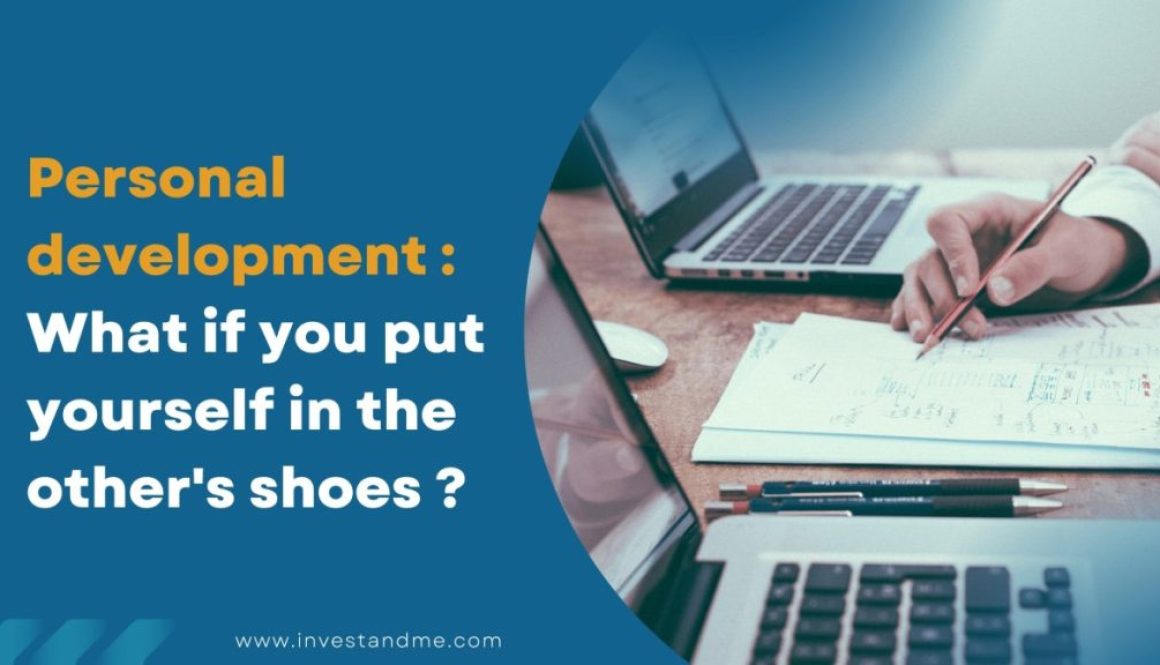Personal development : What if you put yourself in the other’s shoes ?
Introduction
As part of personal development, I deem it is very important to show empathy. You know, I have always been someone who quickly get angry. Indeed I was quickly upset which obviously had repercussions on my way of being and thus on my entourage.
For instance, I used to live in a flat with poor isolation. In the night, while I was trying to sleep, there was always a neighbor to make some noise. Indeed, those sounds quickly got on my nerves and I ended up focusing on those noises which cut off a good portion of my sleeping night. I was spending my nights thinking “Damn neighbors, people shows no regard”,…
Personal development
Even if it is true that a lot of people clearly show lack of respect, whether it is my neighbor or other. The error in such situation often was to address them all the blames and for several reasons :
We do not know anything about their stories
Human judge too quickly based on what he directly perceived but never try to look further, to take into consideration the view of others. Maybe in similar conditions we would have acted the same way?
The author Stephen Covey, in his book “The 7 Habits of Highly Effective People” told a story definitely relevant in our analysis in order to understand the power of perception :
I was riding a subway on Sunday morning in New York. People were sitting quietly, reading papers, or resting with eyes closed. It was a peaceful scene. Then a man and his children entered the subway car. The man sat next to me and closed his eyes, apparently oblivious to his children, who were yelling, throwing things, even grabbing people’s papers.
I couldn’t believe he could be so insensitive. Eventually, with what I felt was unusual patience, I turned and said, “Sir, your children are disturbing people. I wonder if you couldn’t control them a little more?”
The man lifted his gaze as if he saw the situation for the first time. “Oh, you’re right,” he said softly, “I guess I should do something about it. We just came from the hospital where their mother died about an hour ago. I don’t know what to think, and I guess they don’t know how to handle it either.”
Suddenly, I saw things differently. And because I saw differently, I felt differently. I behaved differently. My irritation vanished. I didn’t have to worry about controlling my attitude or my behavior. My heart filled with compassion. “Your wife just died? Oh, I’m so sorry. Can you tell me about it? What can I do to help?” Everything changed in an instant.
Adapted from Stephen R. Covey, The Seven Habits of Highly Effective People (New York: Fireside, 1989), p. 30-31.
This story clearly establishes that the perceptions can be modified based on our history, our knowledge, etc. as a matter of fact, it is necessary to attempt to see the situation from the point of view of the others. In the light of their history, maybe those have all the reasons to act like they do, at least from their point of view.
In some situations, the only person to blame is you
Still in the same book, the author makes an interesting distinction between the group of concern and the group of what we can have an influence on.

Of course, we all have a set of concerns. Nonetheless, we can only have an impact on certain elements. For example, the weather can be one of your concerns as you planned a barbecue this week-end but you can absolutely do nothing about it. On the other hand, if you are concerned about your weight, you can take control and do some sports.
The true point is to focus on what we can have an influence, likewise why loose time and resources to try to modify things on which we have no influence? Not to mention that complaining about the weather won’t improve the situation. However, you can focus on the way you perceive and react to such events
Conclusion
As a conclusion, let’s take back the issue with the neighbors developed earlier. What’s the point to blame them? In such situation, we have several choices, reactions possible. For example, I could go and ask them to calm down, call the police, and many others, still I make the choice to do nothing. Therefore, it is my responsibility, my choice to prefer the consequences of not saying anything and ensure good neighborhood relationships.
The life is made of choices and we are responsible of those that we made. Then it is our duty to not put the responsibilities of our choices on others. In the same way, it is important to consider the perspective of others, to say the thing like they would do in order to understand their behaviors. That way, this would relieve you from some stress and allow for a general improvement of the life quality.
